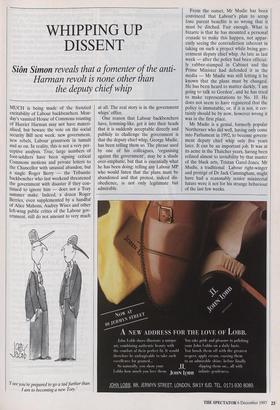WHIPPING UP DISSENT
Sion Simon reveals that a fomenter of the anti-
Harman revolt is none other than the deputy chief whip
MUCH is being made of the frenzied excitability of Labour backbenchers. Mon- day's vaunted House of Commons roasting of Harriet Harman may not have materi- alised, but beware the vote on the social security Bill next week: new government, new rebels, Labour grassroots in tumult and so on. In reality, this is not a very per- ceptive analysis. True, large numbers of foot-soldiers have been signing critical Commons motions and private letters to the Chancellor with unusual abandon, but a single Roger Berry — the Tribunite backbencher who last weekend threatened the government with disaster if they con- tinued to ignore him — does not a Tory summer make. Indeed, a dozen Roger Berries, even supplemented by a handful of Alice Mahons, Audrey Wises and other left-wing public critics of the Labour gov- ernment, still do not amount to very much 7 see you're prepared to go a tad further than I am to becoming a new Toiy.' at all. The real story is in the government whips' office.
One reason that Labour backbenchers have, lemming-like, got it into their heads that it is suddenly acceptable directly and publicly to challenge the government is that the deputy chief whip, George Mudie, has been telling them so. The phrase used by one of his colleagues, 'organising against the government', may be a shade over-emphatic, but that is essentially what he has been doing: telling any Labour MP who would listen that the plans must be abandoned and that protest, indeed dis- obedience, is not only legitimate but admirable. From the outset, Mr Mudie has been convinced that Labour's plan to scrap lone parent benefits is so wrong that it must be ditched. Fair enough. What is bizarre is that he has mounted a personal crusade to make this happen, not appar- ently seeing the contradiction inherent in taking on such a project while being gov- ernment deputy chief whip. As late as last week — after the policy had been official- ly rubber-stamped in Cabinet and the Prime Minister had defended it in the media — Mr Mudie was still letting it be known that the plans must by changed. He has been heard to mutter darkly, am going to talk to Gordon', and he has tried to make representations to No. 10. He does not seem to have registered that the policy is immutable, or, if it is not, it cer- tainly should be by now, however wrong it was in the first place.
Mr Mudie is a genial, formerly popular Northerner who did well, having only come into Parliament in 1992, to become govern- ment deputy chief whip only five years later. It can be an important job. It was at its acme in the Thatcher years, having been refined almost to invisibility by that master of the black arts, Tristan Garel-Jones. Mr Mudie, a traditional Labour right-winger and protégé of Dr Jack Cunningham, might have had a reasonably senior ministerial future were it not for his strange behaviour of the last few weeks. As things stand, Mr Garel-Jones must be spinning in his realpolitikal sarcophagus: Mr Mudie is the hero of the naive on the back benches, and the enemy of the gov- ernment of which he is a part. The social security whip, Kevin Hughes, whose responsibility it will be to get Labour mem- bers through the lobbies in favour of scrap- ping lone parent benefits on 10 December, is understandably furious. An NUM-spon- sored former coalminer in an age when most Labour MPs have never even met one, I am sure Mr Hughes is as unhappy with the policy as are all right-thinking peo- ple. It is a sadistic and unnecessary mis- take, unworthy even of Peter Lilley, to cut benefits to lone parents in this way. But it is now the policy of the government, and Mr Hughes, having made the crucial con- nection between that and being a govern- ment whip, has set aside his own views and got on with selling the policy to the troops. Such is the life of a whip; politics is a Faus- tian business. And Faust eventually went the way of the angels, of course.
Mr Hughes is not the only whip to feel somewhat disappointed by Mr Mudie's unofficial change of direction. The normal- ly sober whips' office meeting the week before last degenerated into what one par- ticipant called 'a full-scale shouting match' when this issue was discussed. I am even told that during the private meeting of the Parliamentary Labour party at which the Social Security Secretary, Harriet Harman, received such a roasting, the deputy chief whip was 'ordered off the premises' for fear of what havoc he might wreak.
And one hardly need mention that nei- ther Social Security nor Treasury ministers are very happy that what should have been a snowball of dissent has been developed into an avalanche by the very man whose job is to control such things. Downing Street is not pleased either.
All of which raises questions about the future of the whips' office. The chief whip, Nick Brown, is as unassailable as anyone can be in the slightly arbitrary maelstrom of a Blair reshuffle, partly because, when not undermined from within, he is good at what he does; and partly because he is explicitly the lieutenant of his namesake, Gordon. His henchpeople are a mixture, perhaps becoming rather volatile, of the old and new: on the one hand are more modern types like Greg Pope, Bridget Prentice, Jane Kennedy and even Janet Anderson; on the other, more traditional whips such as Tommy McAvoy, Jim Dowd, David Clelland and David Jamieson. Many of the latter are just as good as, in some cases better than, the former, but they are likely to find themselves unfairly tarred with the black brush of their cultur- al soulmate, Mr Mudie.
In forming his government in May, the Prime Minister was obviously advised, and correctly so, that a whips' office full of Blairites would not be as effective as one which was more balanced. But the events of the past few weeks may well lead him in another direction when he comes to reshuf- fle, probably in the spring. In one sense it is an advantage that the chief whip falls between the two stools: he is both a mod- ern disciple of Mr Brown and a north-east- ern GMB union fixer in the classic Labour idiom. But it could leave him in an awk- ward position if he were to find himself at the head of a phalanx of proselytising Blairite whips, particularly as there is a his- tory of differences between him and the Prime Minster which, while entirely recon- ciled, will never be forgotten.
The irony is that the government does not have a problem in the whips' office in general; it actually has strength in depth. Either Jane Anderson or Tommy McAvoy would make fine replacements for Mr Mudie when he is sacked in the spring.
But the serious issue, and it is one which many commentators are failing to under- stand, is that the government does not have a problem with its backbenchers either. You do not lose iron discipline overnight; nor have they. Were it not for Mr Mudie's unprecedented gamekeeper-turned-poach- er antics, the current situation would never have got so out of hand; nor will it again. As for the deputy chief whip, he has not so much shot himself in the foot as right between the eyes.




















































































 Previous page
Previous page